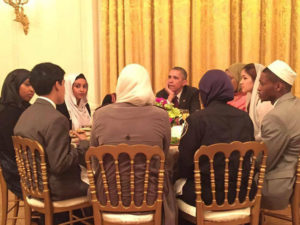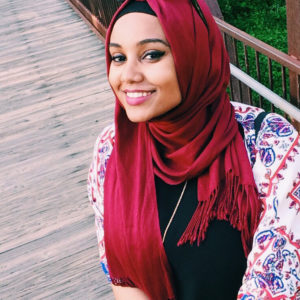By Edie Gross
Riham Osman ’13 was one of nine young Muslims at the dinner table with President Barack Obama. But he turned to her first, and she wasn’t about to waste the opportunity.
How will the administration engage the Muslim community on issues that matter to all Americans? asked Osman, suggesting Obama appoint a Muslim to a Cabinet-level position.
And how will the White House work with Muslims to counter violent extremism, rather than singling them out as perpetrators? Inviting Muslims to the table, she told Obama, would make those discussions more productive and reduce media bias.
Obama listened politely and joked about his own rocky relationship with the media. Then he turned to another invited guest at the White House iftar dinner during Ramadan in June 2015.
But Osman, the communications coordinator for the Muslim Public Affairs Council (MPAC), wasn’t done. As the dinner wound down, Osman asked the president to acknowledge that violent extremism was not restricted to any one community.
Obama noted that ISIS is organized, so it tends to get more attention.
But he agreed that extremists come from all backgrounds – and he reiterated that point during a speech at the Pentagon several weeks later.
“I definitely saw him avoid my question, and I pushed. I was not the favorite at the table,” Osman, 24, joked later on. “But I have a community to report to. I felt I could not leave the table without getting my question answered.”
UMW History Professor Nabil Al-Tikriti recalled Osman as a strong student and critical thinker, and said he wasn’t surprised she carried those qualities beyond the classroom.
“That’s exactly the kind of role she should take on: strong and principled and relentless,” he said. “I’m glad she asked twice.”
There was a time, Osman recalled, when she would have been too shy to ask even once. Born in Sudan and raised in Northern Virginia, Osman just wanted to fit in.
At UMW, she did not seek out other Muslims until Ramadan, when the faithful fast from dawn until sunset each day for a month. She joined other Muslims at a campus iftar – the meal that breaks the fast.
“To be able to learn from them, that they were completely normal, that they had fun, to be able to hang out with like-minded people was priceless to me,” she said.
About three months into her freshman year, Osman began wearing the hijab, or head covering. She encountered nothing but support from the UMW community.
But the summer before her junior year, she was fired her first day on the job at Air France when she showed up wearing her hijab. She spent her last two years at UMW fielding phone calls from lawyers and the media while earning a bachelor’s degree in international affairs with a minor in Middle Eastern studies. The airline ultimately changed its dress code in the U.S.
The experience, Osman said, helped her find her voice. Now she speaks on behalf of Muslims through MPAC, an advocacy group that focuses on national security and civil rights issues.
“It took me a long time to understand my identity,” she said, “and now that I understand it I want to help my community.”


